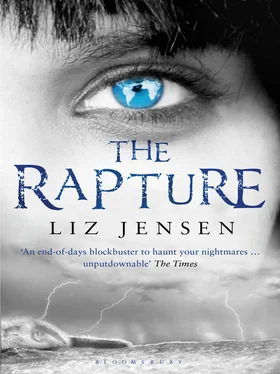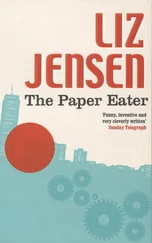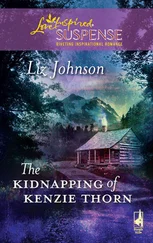That summer, the summer all the rules began to change, June seemed to last for a thousand years. The temperatures were merciless: thirty-eight, thirty-nine, then forty in the shade. It was heat to die in, to go nuts in, or to spawn. Old folk collapsed, dogs were cooked alive in cars, lovers couldn’t keep their hands off each other. The sky pressed down like a furnace lid, shrinking the subsoil, cracking concrete, killing shrubs from the roots up. In the parched suburbs, ice-cream vans plinked their baby tunes into streets that sweated tar. Down at the harbour, the sea reflected the sun in tiny, barbaric mirrors. Asphyxiated, you longed for rain. It didn’t come.
But other things came, seemingly at random. The teenage killer, Bethany Krall, was one of them. If I didn’t know, back then, that turbulence obeys specific rules, I know it now.
During just about every one of those nights, I’d have dreams that were so vivid they felt digitally enhanced. Sometimes I could do more than just walk and run and jump. I could do cartwheels: I could practically fly. I’d be an acrobat, flinging my body across the empty air, then floating in the stratosphere like a Chagall maiden. Other times I’d find myself with Alex. He’d be throwing his head back to laugh, as if nothing had happened. Or we’d be having urgent sex, in a thrash of limbs. Or engaging in the other thing we’d so quickly become experts at: fighting. Viciously. Also as if nothing had happened.
Then I’d wake. I’d lie there, my upper body still sweating, the mail-order fan strafing the air across my naked skin, and let the new day infiltrate in stages. The last stage, before I rose to wash and dress and fight my tangled hair, like someone emerging from a date-rape drugging, would be the one in which I’d dutifully count my blessings. This folksy little ritual stayed brief, because the way I saw it, they didn’t add up to much.
When the skies finally broke, it felt biblical, megalomaniacal, as though orchestrated from on high by an irate Jehovah. On the coasts, cliffs subsided, tipping soil and rubble and silt on to the beaches, where they lodged in defiant heaps. Charcoal clouds erupted on the horizon and massed into precarious metropolises of air. Out at sea, beyond the grey stone bulwarks of the port, zigzags of lightning electrocuted the water, bringing poltergeist winds that sucked random objects up to whirl and dump. Passionate gusts punched at the sails of struggling boats and then headed inland, flattening corn, uprooting trees, smashing hop silos and storage barns, whisking up torn rubbish sacks that pirouetted in the sky like the ghostly spirits of retail folly. Maverick weather was becoming the norm across the globe: we’d all learned that by now, and we were already frustrated by its theatrical attention-seeking, the sheer woe of its extremes. Cause and effect. Get used to the way A leads to B. Get used to living in interesting times. Learn that nothing is random. Watch out for the tipping point. Look behind you: perhaps it’s been and gone.
Psychic revolution, worlds upended, interrogations of the status quo, the eternal proximity of Hell: subjects close to my heart at this point. Popular wisdom declares that it’s a mistake to make major changes in the wake of a catastrophic event in one’s personal life. That you should stay close to your loved ones—or in their absence, to those best placed and most willing to hold your hand through the horror-show of your new, reconfigured life. So why, in the aftermath of my accident, had I so obstinately done the opposite? I was so sure, when I made it, that my decision to quit London was the right one, arrived at after a cool mental listing of the pros and cons. But my Chagall-maiden dreams and the restlessness that infected me seemed evidence of another, less welcome possibility: that once again, I had banjaxed my own life — as thoroughly and as definitively as only a professional psychologist can. My brain, working overtime with denial, was a sick centrifuge operating at full tilt.
In the mornings, the modest skyline of Hadport fizzes gently with coastal fog which, pierced by the first light, can take on a metaphysical cast. There’s a spritz of bright air meeting water, of delicate chemical auras dancing around one another before mingling and ascending to the stratosphere. Conservative-minded angels, conscious of their celestial pension constraints and forced to relocate, might choose a town like this to spend their sunset years. So might my once energetic and cultured father, if he’d kept his marbles long enough to leaf through brochures about retirement complexes, instead of Alzheimering his way into a nursing home to spend his waking hours watching Cartoon Network and drooling into a plastic bib: as sorry an end for a former diplomat as can be imagined. If you venture out early enough you can taste the sharp tang of ozone in your mouth. Decent parking , my practical-minded, pre-la-la father would have said, if he’d accompanied me on my morning sorties along the gum-studded pavements of my new home town. Useful in your situation, Gabrielle . Later in the day, his high opinion might downgrade itself a notch. Hadport, being near the Channel Tunnel, has a high quota of illegal immigrants and asylum seekers: the bed-and-breakfast population, the shallow-rooted underclass about which the Courier opines on behalf of ‘heritage citizens’, who have graduated from compassion fatigue to a higher realm of pathological resentment which the paper’s editorials refer to as justified indignation. As the day rolls itself out, the litter bins fill and then erupt with Starbucks beakers, gossip magazines, buckled beer-cans, burger cartons gaping open like polystyrene clams: the husks of what nourishes the British soul. With dusk come mangy foxes, slinking out to scavenge in the drilling heat.
In my new life, I spend most weekdays two kilometres outside town, beyond a network of clogged arterial roads and mini-roundabouts. Skirt the brownfield site along East Road, past the Sleepeezee warehouse, the Souls Harbour Apostolic Church, the fuel cell plant, and a construction rumoured to be generating a pioneer high-rise pig farm, turn right by the giant pylon which, from a certain angle, appears to straddle, rodeo-like, the World of Leather, and you’ll spot a discreet signpost to my place of work.
Somebody should probably have taken a wrecker ball to it long ago. Built in the early twentieth century, the white mansion, seen through the electrified perimeter fence, resembles a decrepit cruise ship marooned amongst clusters of monkey puzzles, cypress and spiky palms: Edwardian, Gulf Stream trees. Once a hotel for convalescents prescribed sea air, its white-brick façade and scattered outbuildings are zigzagged with cracks like ancient marzipan. Wisteria and honeysuckle meander up wrought-iron balconies, trellises and gazebos blistered by rust. You might hope to find Sleeping Beauty in there, on display in a glass case, somewhere just beyond Reception. But instead, you’ll be entering a museum display of dados, cornices and ceiling roses, barnacled to peeling plasterwork. The building manufactures its own air, air that has not quite caught up with the scented-candle culture of modern times. Forest Glade room freshener predominates, struggling to mask deeper strata of Toilet Duck, dry rot, and the sad-sweet chemical smell of psychic suffering.
Welcome to Oxsmith Adolescent Secure Psychiatric Hospital, home to a hundred of the most dangerous children in the country.
Among them, Bethany Krall.
From my ground-floor office, you can see a row of white turbines in the distance, rooted in the sea like elegant food-mixers. I admire the grace of their engineering, their slim discretion. I have thought about painting them but the urge is too theoretical, too distanced from the part of me that still functions. I often stare out at the horizon, mesmerised by their smoothly industrious response to the wind. Sometimes, when I have a very specific form of cabin fever, I copy their movements, whirling my arms in rhythm — not to capture energy, but to release it. Glimpsing myself in a corner of the mirror, caught unawares, I’ll notice my hair, my eyes, my mouth, the intense tilt of my face, but I know better than to set any store by my looks, such as they are. They’ve done me no good.
Читать дальше












